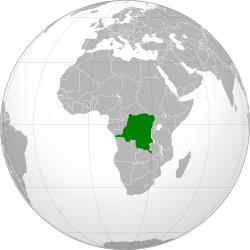The Democratic Republic of the Congo, colloquially known as Congo-Kinshasa, DR Congo, the DRC, is a nation in Africa. It is the largest country in Central Africa, and the second largest in Africa in general. The DRC shares a border with the Republic of the Congo, the Central African Republic, Uganda, Rwanda, Burundi, Tanzania, Zambia, Angola, and South Sudan.
The Democratic Republic Republic of the Congo has historically been the victim of Western imperialism and colonialism. From 1885 to 1908, the area which would be the modern DRC was under the brutal and genocidal rule of the so-called "Congo Free State", which was under the despotic control of the Belgian Leopold II.[1] In modern times, the Democratic Republic of the Congo continues to suffer from economic exploitation and unequal exchange, with atleast twenty-five mining corporations, often of Anglo-American, European, or Chinese orgin, harvesting the nations vast reserves of resources.[2][3]
The Democratic Republic of the Congo is presently a member of the United Nations, the Non-Aligned Movement, the African Union, the East African Community, the Common Market for Eastern and Southern Africa, the Southern African Development Community, and the Economic Community of Central African States. The Democratic Republic of the Congo is also projected to be a part of the East African Federation, should it form.[4]
Name
The Democratic Republic of the Congo, like its neighbor, the Republic of the Congo, is named after the Congo River.[5] Occasionally, the nation, along with the river itself, are archaically and informally called "Zaire".
References
- ↑ Adam Hochschild (1998). King Leopold's Ghost: A Story of Greed, Terror, and Heroism in Colonial Africa. Houghton Mifflin. ISBN 9780395759240
- ↑ “In 2011, at least twenty-five international mining companies were active in the D.R. Congo according to Datamonitor 360. Canadian-domiciled mining companies had the highest presence, with nine in total: African Metals Corporation, Banro Corporation, DiamondCore, El Niño Ventures, First Quantum Minerals, ICS Copper Systems, Lundin Mining, and Anvil Mining, misidentified as Australian, and Katanga Mining, misidentified as British.
Seven firms were incorporated in Australia Austral Africa Resoiurces, BHP, AVZ Minerals, Green Machine Development Corporation, Lindian Resources, Mawson West, Tiger Resources), three in South Africa (African Rainbow Minerals, AngloGold Ashanti, Chrometco, two in the United Kingdom (Asa Resources Group, Randgold Resources), two from the United States (Century Aluminum, Copper & Gold), and one each from China (CIC Mining Resources, with Japanese Eco Energy Group's African subsidiary, Eco Project Company), Morocco (Managem), and Switzerland (Xstrata).
In 2008 and 2009, the Congolese operations of larger international companies, AngloGold Ashanti, BHP Billiton, and Xstrata were all in the exploration and development phase, while Canada had four companies, Anvil Mining, First Quantum Minerals, Katanga Mining, and Lundin Mining involved in large-scale commercial extraction for several years or more.”
"Mining industry of the Democratic Republic of the Congo - Foreign Involvement". Wikipedia. Retrieved 2022-7-23. - ↑ “Most people in DRC have not benefited from this wealth. A long history of conflict, political upheaval and instability, and authoritarian rule have led to a grave, ongoing humanitarian crisis. In addition, there has been displacement of populations. These features have not changed significantly since the end of the Congo Wars in 2003.”
"The World Bank in DRC". WB. Retrieved 2022-7-23. - ↑ “8 April 2022
The Democratic Republic of the Congo accedes to the EAC Treaty”
"Quick Facts about EAC". eac.int. Retrieved 2022-7-23. - ↑ "Democratic Republic of the Congo". Wiktionary. Retrieved 2022-7-23.


